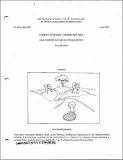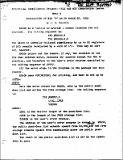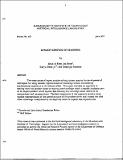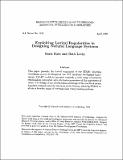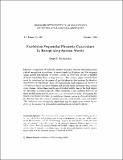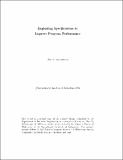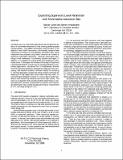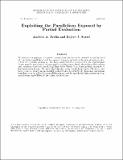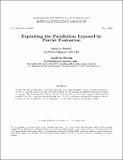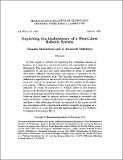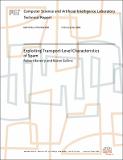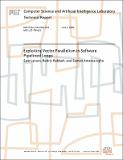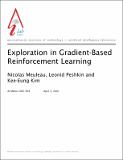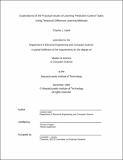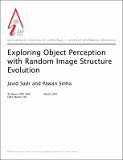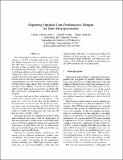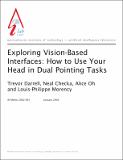Browsing Computer Science and Artificial Intelligence Lab (CSAIL) by Title
Now showing items 1171-1190 of 3804
-
Expert Systems: Where Are We? And Where Do We Go from Here?
(1982-06-01)Work on Expert Systems has received extensive attention recently, prompting growing interest in a range of environments. Much has been made of the basic concept and the rule-based system approach typically used to ... -
Explanation of Big "P" as of March 20, 1959
(1959-03-01)ERROR is a routine to provide a common location for all routines. Its celling sequence is: SXD SERROR,4 TSX SERROR+1,4 The above is normally followed immediately by up to 20 registers of BCD remarks terminated by a word ... -
Explicit Control of Reasoning
(1977-06-01)The construction of expert problem-solving systems requires the development of techniques for using modular representations of knowledge without encountering combinatorial explosions in the solution effort. This report ... -
Exploiting Lexical Regularities in Designing Natural Language Systems
(1988-04-01)This paper presents the lexical component of the START Question Answering system developed at the MIT Artificial Intelligence Laboratory. START is able to interpret correctly a wide range of semantic relationships associated ... -
Exploiting Parallelism in VLSI CAD
(1986-01)In the domain of computer science, particularly VLSI CAD, an increasing amount of engineering time is spent running compute-bound programs. Many of these programs have an intrinsic parallelism that is externally accessible. ... -
Exploiting Sequential Phonetic Constraints in Recognizing Spoken Words
(1985-10-01)Machine recognition of spoken language requires developing more robust recognition algorithms. The current paper extends the work of Shipman and Zue by investigating the power of partial phonetic descriptions. First ... -
Exploiting Specifications to Improve Program Performance
(1994-02)Although programmers benefit from interface specifications when reasoning about programs, existing compilers do not. In this thesis, I discuss how to incorporate specifications into a programming language to improve ... -
Exploiting Superword Level Parallelism with Multimedia Instruction Sets
(1999-11)Increasing focus on multimedia applications has prompted the addition of multimedia extensions to most existing general-purpose microprocessors. This added functionality comes primarily in the addition of short SIMD ... -
Exploiting the Parallelism Exposed by Partial Evaluation
(1993-04-01)We describe an approach to parallel compilation that seeks to harness the vast amount of fine-grain parallelism that is exposed through partial evaluation of numerically-intensive scientific programs. We have constructed ... -
Exploiting the Parallelism Exposed by Partial Evaluation
(1994-05-01)We describe the key role played by partial evaluation in the Supercomputing Toolkit, a parallel computing system for scientific applications that effectively exploits the vast amount of parallelism exposed by partial ... -
Exploiting the Redundancy of a Hand-Arm Robotic System
(1990-10-01)In this report, a method for exploiting the redundancy of a hand-arm mechanical system for manipulation tasks is illustrated. The basic idea is to try to exploit the different intrinsic capabilities of the arm and hand ... -
Exploiting Transport-Level Characteristics of Spam
(2008-02-15)In the arms race to secure electronic mail users and servers fromunsolicited messages (spam), the most successful solutions employtechniques that are difficult for spammers to circumvent. Thisresearch investigates the ... -
Exploiting Vector Parallelism in Software Pipelined Loops
(2005-06-03)An emerging trend in processor design is the incorporation of short vector instructions into the ISA. In fact, vector extensions have appeared in most general-purpose microprocessors. To utilize these instructions, ... -
Exploration in Gradient-Based Reinforcement Learning
(2001-04-03)Gradient-based policy search is an alternative to value-function-based methods for reinforcement learning in non-Markovian domains. One apparent drawback of policy search is its requirement that all actions be 'on-policy'; ... -
Explorations in Low-Cost Compliant Robotics
(2007-01-30)This thesis presents the findings of exploratory research in low-cost compliant robotics. The most heavily leveraged trade-off is that of mechanical precision for computational power, with the hope that the price of future ... -
Explorations of the Practical Issues of Learning Prediction-Control Tasks Using Temporal Difference Learning Methods
(1992-12-01)There has been recent interest in using temporal difference learning methods to attack problems of prediction and control. While these algorithms have been brought to bear on many problems, they remain poorly understood. ... -
Exploring Object Perception with Random Image Structure Evolution
(2001-03-01)We have developed a technique called RISE (Random Image Structure Evolution), by which one may systematically sample continuous paths in a high-dimensional image space. A basic RISE sequence depicts the evolution of an ... -
Exploring Optimal Cost-Performance Designs for RAW processors
(1998-06)The semiconductor industry roadmap projects that advances in VLSI technology will permit more than one billion transistors on a chip by the year 2010. The MIT Raw microprocessor is a proposed architecture that strives to ... -
Exploring Vision-Based Interfaces: How to Use Your Head in Dual Pointing Tasks
(2002-01-01)The utility of vision-based face tracking for dual pointing tasks is evaluated. We first describe a 3-D face tracking technique based on real-time parametric motion-stereo, which is non-invasive, robust, and self-initialized. ...

